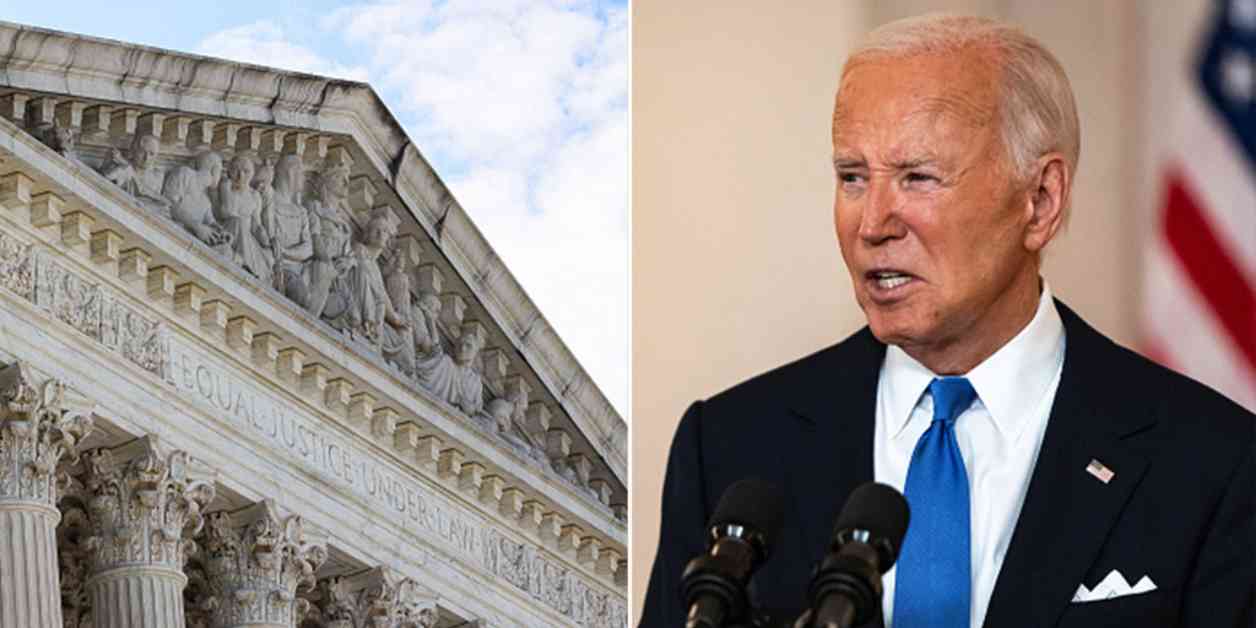The Supreme Court’s recent decision to strike down a Biden-Harris Title IX change regarding men in women’s sports has sparked controversy and debate across the nation. The 5-4 vote on Friday rejected the Biden administration’s emergency request to enforce portions of a new rule that includes protections from discrimination for transgender students under Title IX. This decision specifically addressed the issue of allowing biological men in women’s bathrooms, locker rooms, and dorms in 10 states where state-level and local-level rules were in place to prevent it.
The sweeping rule, issued in April, clarified that Title IX’s ban on “sex” discrimination in schools covers discrimination based on gender identity, sexual orientation, and “pregnancy or related conditions.” This rule, which took effect on August 1st, marked a significant step in recognizing and protecting the rights of transgender individuals. However, it also raised concerns and opposition from several Republican attorneys general who argued that it would conflict with state laws blocking transgender students from participating in women’s sports.
The Biden administration maintained that the regulation did not address athletic eligibility. Despite this assertion, multiple experts presented evidence to suggest that the rule could result in more biological men participating in women’s sports. The court’s decision to reject the Biden administration’s request dealt a blow to ongoing efforts to protect transgender inclusion and equality.
Subheadings
1. Republican Opposition to the Rule
2. Legal Challenges and Arguments
3. Impact on Women’s Sports and Athletes
Republican Opposition to the Rule
More than two dozen Republican attorneys general took legal action against the Biden administration over the Title IX rule. They contended that the rule would interfere with existing state laws that prohibit transgender students from competing in women’s sports. Their opposition centered on the belief that allowing biological men to participate in women’s sports would create an unfair advantage and undermine the integrity of female athletic competitions.
The Biden administration’s insistence that the rule did not address athletic eligibility was met with skepticism and criticism from various quarters. Critics argued that the rule’s broad language and implications could pave the way for biological men to compete against women in sports, potentially leading to disparities in performance and opportunities for female athletes.
Legal Challenges and Arguments
The legal battle over the Title IX rule highlighted deep divisions and differing interpretations of gender identity and discrimination in the realm of sports. While proponents of the rule viewed it as a crucial step towards ensuring equality and inclusivity for transgender individuals, opponents raised concerns about the potential impact on women’s sports and the principles of fair competition.
The Supreme Court’s decision to reject the Biden administration’s request reflected the complexities and contentious nature of the issue. The court’s unsigned order stated that the government had not provided sufficient grounds to overturn the lower courts’ rulings on the legality of certain provisions within the rule. This decision underscored the need for further debate and discussion on how to balance the rights of transgender individuals with the principles of fairness and equality in sports.
Impact on Women’s Sports and Athletes
The debate over transgender inclusion in women’s sports has drawn attention to the experiences and perspectives of female athletes who have voiced concerns about competing against transgender individuals. A group of 102 female athletes and 26 states petitioned the Supreme Court to address challenges related to state laws banning transgender women from competing against biological female athletes.
These athletes argued that physical fitness tests demonstrate inherent differences between men and women at every age, emphasizing the importance of maintaining separate categories for male and female athletes. They described the emotional and psychological toll of being forced to compete against transgender individuals in women’s sports, highlighting feelings of humiliation, frustration, and exclusion from their own category.
The controversy surrounding transgender inclusion in women’s sports has sparked a broader conversation about the principles of fairness, equality, and respect for all athletes. ESPN analyst Kirk Herbstreit expressed his belief that men do not belong in women’s sports, echoing concerns about maintaining a level playing field and upholding the integrity of athletic competition. His sentiments were echoed by OutKick host Riley Gaines, who hailed the Supreme Court’s decision as a victory for women, free speech, and common sense.
In conclusion, the Supreme Court’s rejection of the Biden-Harris Title IX change regarding men in women’s sports has ignited debate and reflection on the intersection of gender identity, discrimination, and athletic competition. While the ruling has raised concerns and opposition from some quarters, it has also highlighted the need for thoughtful dialogue and consideration of the diverse perspectives and experiences of all athletes. As the legal and social landscape continues to evolve, it is essential to prioritize inclusivity, fairness, and respect in the realm of sports.


